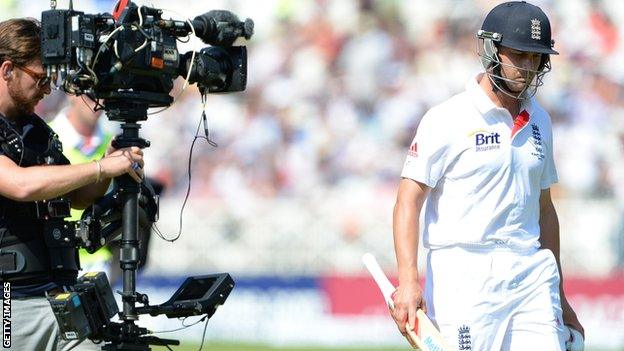Ashes 2013: ICC admits Jonathan Trott umpire mistake
- Published

Jonathan Trott
The International Cricket Council has confirmed that England batsman Jonathan Trott should not have been given out lbw during the first Ashes Test.
Trott was initially given not out, but dismissed by third umpire Marais Erasmus when Australia used the Decision Review System (DRS).
The ICC said it was one of "three uncorrected errors" at Trent Bridge.
"The umpires did a good job under difficult conditions," said ICC chief executive David Richardson.
"However, like the players, umpires can also have good and bad days but we all know that the umpire's decision, right or wrong, is final and must be accepted."
Trott was dismissed first ball in England's second innings by Mitchell Starc, despite getting an inside edge.
He was given not out by on-field umpire Aleem Dar but dismissed by Erasmus despite the key HotSpot camera angle being unavailable to the official.
The two other uncorrected decisions involved Stuart Broad, both the edge that carried to slip via Brad Haddin's gloves and an lbw appeal where he did not offer a shot, but neither could be corrected as Australia had used up their reviews.
The ICC's overall assessment of umpiring in England's dramatic 14-run victory at Trent Bridge also revealed officials made a total of 72 decisions, well above the average (49) for a Test match featuring DRS.
The percentage of correct decisions before reviews was 90.3% but climbed to 95.8% as a result of the use of DRS. That represented an increase of 5.5% in correct decisions, also the average increase from DRS Test matches in 2012-13.
Richardson added: "This reflects the calibre of umpires Aleem Dar, Kumar Dharmasena and Marais Erasmus, who have consistently performed at a high level.
"While the ICC has complete faith in the ability of its umpires, our confidence in technology is also strengthened by the fact that there was an increase in the number of correct decisions in the Trent Bridge Test through the use of the DRS.
"Technology was introduced with the objective of eradicating the obvious umpiring errors, and to get as many correct decisions as possible.
"If it can help increase the correct decisions by 5.5%, then it is a good outcome, but we must continue to strive to improve umpiring and the performance of the DRS."
- Published15 July 2013
- Published15 July 2013
- Published14 July 2013